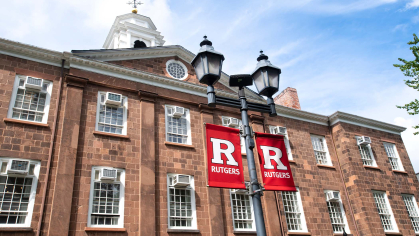Nationwide Report Cites Rutgers’ Efforts to Support Low-Income Students

Rutgers University-New Brunswick is a national leader among universities committed to improving the enrollment, retention and graduation of low-income students, according to the latest report [PDF] by the American Talent Initiative (ATI).
The latest findings – from the ATI coalition of 120 universities pledged to enroll 50,000 more low-income students by 2025 – reveal that many universities and colleges nationwide, including Rutgers, have seen a leveling of the number of their low-income students over the past two years. This is due, in part, because of a population decline among young Americans, especially in the Northeast.
Still, the ATI report underscores the strategic and multi-dimensional efforts at Rutgers and other universities to admit and graduate more low-income students, first-generation students and students from historically underrepresented groups.
Those efforts include the Rutgers Future Scholars program, which each year accepts 215 new first-generation, low-income, academically promising middle school students from New Brunswick, Piscataway, Newark, Camden and Rahway and provides services to help them succeed in college.
“Our message to qualified students from lower economic backgrounds is simple: If you come to Rutgers, you will thrive,” said Courtney McAnuff, vice chancellor for enrollment management. “Our high graduation rate for all students, including Pell grant recipients and African-American students, proves that our mentoring and other support systems ensure we’re not just recruiting lower-income students, but investing in their success.”
Enobong (Anna) Branch, vice chancellor for diversity, inclusion and community engagement, said, “Access and equity are part of Rutgers–New Brunswick’s responsibility as a public flagship university. We have a duty and obligation to educate the bright young people of this state, and ensure that their economic circumstance is not a barrier.”
McAnuff pointed to the following statistics that highlight Rutgers’ effectiveness in ensuring student success through Rutgers Future Scholars and related programs:
- Rutgers has been a top performer among ATI colleges and universities since the coalition’s launch during the 2015-2016 academic year. About 30 percent of Rutgers-New Brunswick students receive Pell grants, making Rutgers one of only 45 ATI members to have a Pell grant share at or above 20 percent and one of 35 schools that have maintained Pell shares at or above 20 percent each year.
- Rutgers’ four-year and six-year graduation rates for all students are 24 percent and 21 percent higher, respectively, than the national average. Rutgers’ gap in graduation rates between Pell grant recipients and students overall is less than 3 percent compared with a 9 percent gap nationwide. And Rutgers’ graduation rate for black students is 38 percent higher than the national average. Rutgers leads in ensuring that low-income, first-generation and historically underrepresented students succeed.
- Beyond student success, the investment in Rutgers Future Scholars has a positive impact on New Jersey. For every 200 low-income students who graduate from Rutgers, New Jersey saves $32 million because those students go on to have successful careers, pay taxes and are less likely to rely on public services such as Medicaid, public housing and other public assistance programs.
McAnuff attributed Rutgers’ strong graduation rates to a variety of programs and resources across Rutgers that provides students with mentoring and other support. One new technological resource is the the MyRutgers “virtual one stop” portal that offers students direct links to applications and forms needed to navigate the student experience, the co-location of key student services at Records Hall and the planned creation of a One Stop Student Services Center on the Busch Campus to transform the student experience.
Rutgers-New Brunswick Chancellor Christopher Molloy has appointed McAnuff, Branch, Executive Vice Chancellor Felicia McGinty and Vice Chancellor for Student Affairs Salvador Mena to a leadership team to explore further improvements to support the recruitment, retention and graduation of low-income students, first-generation students and students from historically underrepresented backgrounds.
Rutgers Future Scholars serves as an important part of this continuum by preparing middle school and high school students for college. Nearly 100 percent of its participants graduate high school. Of those, nearly 400 program alumni are currently enrolled at Rutgers universitywide, with additional students enrolled at other four-year institutions. Of those currently enrolled at community colleges, many will eventually transfer to Rutgers.
As a further support for these students, Rutgers-New Brunswick is exploring a dual admission pathway for community college students that would guarantee them admission at Rutgers upon earning an associate’s degree.


